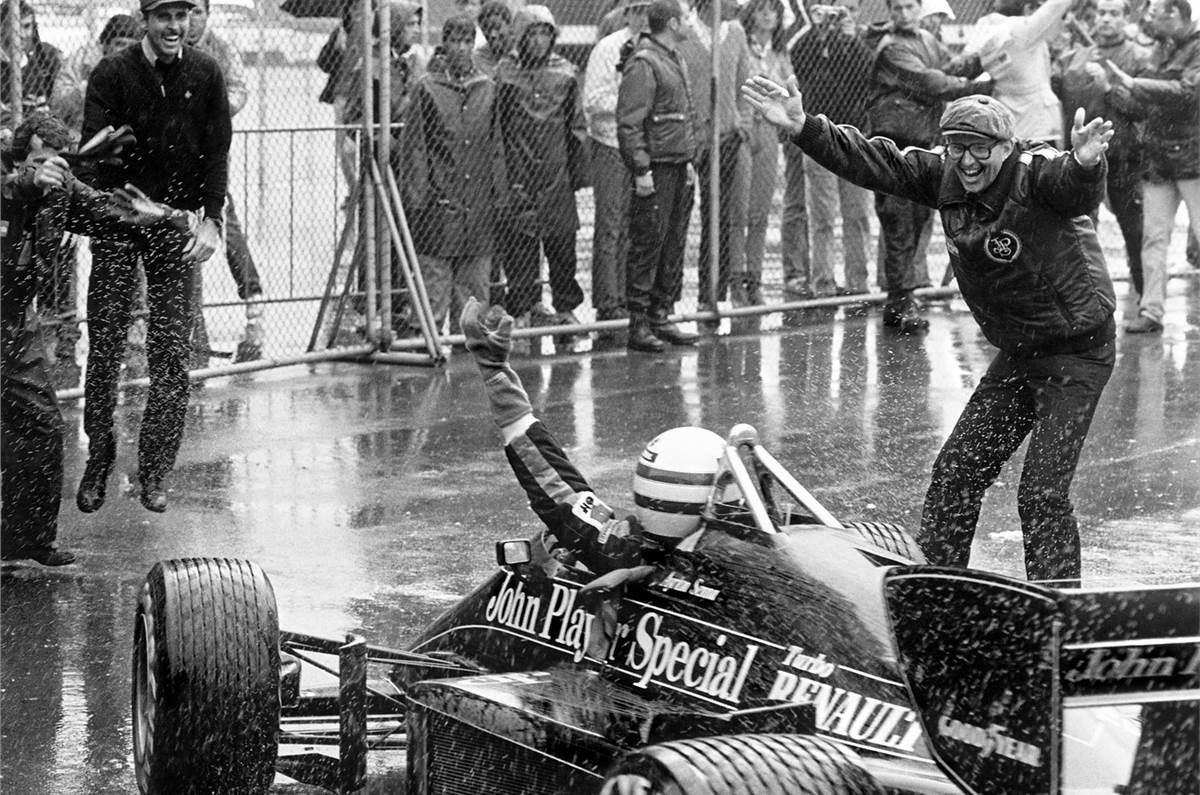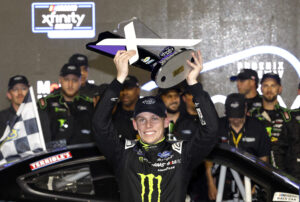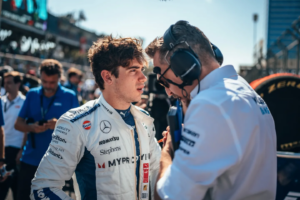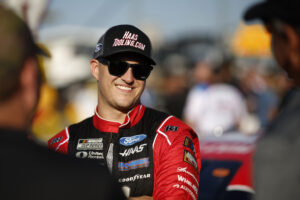Who are the top drivers in wet conditions? Ranking F1’s greatest wet weather drivers of all time and a look at their best performances.
Wet races are regarded as the ultimate skill test for a race driver. That’s when Formula One’s titans shine. It’s no surprise if you opened this article already knowing who’s on the list. These drivers are in a league of their own. They engraved their names in the history of F1 for a reason, and we are here to honour them now and forever. Here is a run through some of the best wet weather drivers in F1 history.
Michael Schumacher
Michael Schumacher etched his name on F1’s Hall of Fame following a remarkable 19-year career. He went down in history not just for numbers, but for his ability to produce stunning performances under any circumstances, even when racing in a dog-of-a-car.
The start of something special
Schumacher made his Formula 1 debut in 1991 at the Belgian Grand Prix driving a Benetton Ford. After a year, and at the same Grand Prix, he managed to secure his maiden win at his beloved Spa-Francorchamps circuit following a brilliant drive in tricky wet and dry conditions.
The German qualified third on the grid behind Ayrton Senna and polesitter Nigel Mansell. After a 34-lap battle between the top four, he finally snatched the lead from Mansell and went on with 4.5 seconds ahead to win the 44-lap race and take his first-ever fastest lap (1:53.791). Aged only 23, Schumacher took the first of his 91 victories at one of the most difficult tracks under the most difficult conditions, proving why he was a star in the making.
Schumacher: The Rainmaster
Schumacher joined Ferrari as a two-time world champion in 1996. Although Ferrari had not won a championship in over a decade, he felt that the Italian team would be his long-term project, saying this was the kind of motivation he was looking for. “I was not looking for an easy job where I sit in the car and I’ll win every race, or where people at least expect me to win every race; this is not the challenge I’m looking for.”
The German had a shaky start to the season with a mix of DNFs and podium finishes. He was struggling to find a way to grab his first victory with the Italian team. The Ferrari F310 car put him in the challenge he was looking for; it was less competitive than the Williams and the rest of the field. It was so bad that his teammate Eddie Irvine referred to it later as a “piece of junk.” However, in the seventh round in Spain, the magic happened.
1996 Spanish Grand Prix
It’s time for the Spanish Grand Prix. Schumacher was in the third grid slot behind the two Williams, Jacques Villeneuve and Damon Hill. Horrendous weather conditions. Rain-soaked Circuit de Catalunya. What are the chances of winning that race with that car in these conditions? In Formula 1, you have to expect the unexpected.
Schumacher did not have a good start, falling to sixth by the end of the opening lap. The rain hadn’t stopped, and visibility was so bad that six cars crashed or spun off into retirement including his teammate who was in fifth. Schumacher moved up one position after Irvine’s spin and later moved into fourth when Hill went into the gravel. On the fifth lap, Schumacher overtook Benetton’s Gerhard Berger climbing to third. Lap nine, and Schumacher’s performance was out of this world. He passed Berger’s teammate Jean Alesi into second. Eyes on the race leader Villeneuve.
On lap 12, Schumacher finally snatched the lead and never looked back. He kept dominating the 65-lap race, regularly lapping five seconds quicker than anyone else. Fast forward to the finish line, when only six drivers managed to cross it, Schumacher notched up his first victory with Ferrari by 45 seconds over Alesi, giving us an absolute masterpiece of a race.
This win is arguably Schumacher’s greatest of his 91 victories. He cemented the nickname he earned of “Rainmaster.” The legendary Stirling Moss summed up Schumi’s masterful display by saying, “that wasn’t a race. That was a demonstration of brilliance.” Truly one of F1’s finest wet weather drivers.
All wet-weather races won by Schumacher
| Grand Prix | Started | Result |
| Belgium 1992 | 3rd | 1st |
| France 1995 | 2nd | 1st |
| Belgium 1995 | 16th | 1st |
| Europe 1995 | 3rd | 1st |
| Japan 1995 | 1st | 1st |
| Spain 1996 | 3rd | 1st |
| Monaco 1997 | 2nd | 1st |
| France 1997 | 1st | 1st |
| Belgium 1997 | 3rd | 1st |
| Argentina 1998 | 2nd | 1st |
| Great Britain 1998 | 2nd | 1st |
| Europe 2000 | 2nd | 1st |
| Canada 2000 | 1st | 1st |
| USA 2000 | 1st | 1st |
| Japan 2000 | 1st | 1st |
| Malaysia 2001 | 1st | 1st |
| Great Britain 2002 | 3rd | 1st |
| Austria 2003 | 1st | 1st |
| USA 2003 | 7th | 1st |
| Malaysia 2004 | 1st | 1st |
| China 2006 | 6th | 1st |
Wet races: 54 | Wins: 21 | Win percentage: 38.89%
Ayrton Senna
Ayrton Senna. The God of wet races. The one who made it look so easy. And the one who proved that practice makes perfect.
Senna wasn’t a fan of driving on wet tracks at first. When he participated in his first go-kart race in the rain, he didn’t perform well, but he soon realized that if he wants to be a great driver, he had to work on this skill. Senna decided to go to the Interlagos Go-Kart Circuit whenever the rain falls, and he kept driving around the circuit and practising for hours and days until he mastered it. The circuit was later renamed Kartódromo Ayrton Senna in his honour.
Senna’s life and career were tragically cut short in 1994 by his fateful accident at the San Marino Grand Prix when he was just 34, but his name and legacy will live on forever.
1985 Portuguese Grand Prix
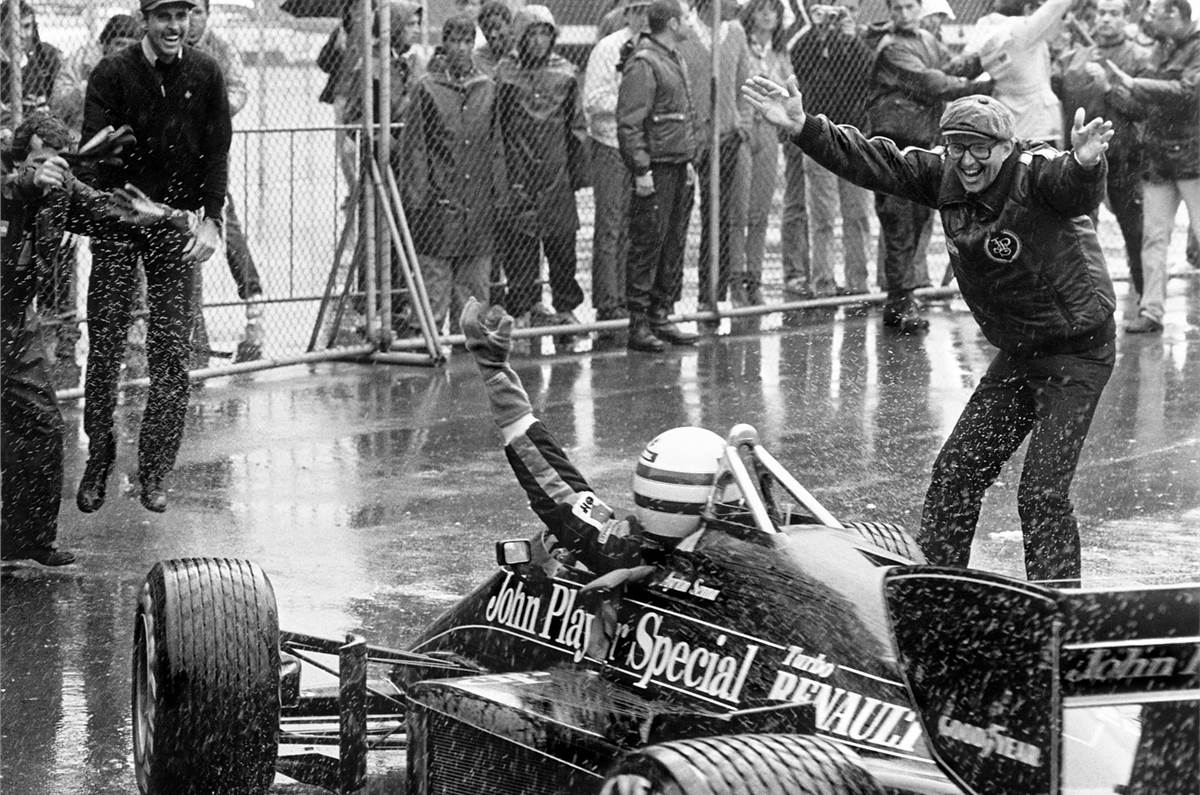
Although the 1993 European Grand Prix is more famous, Ayrton himself rated this one as the finest of his life.
It was his first season with Lotus Renault, and his second in Formula 1. The Brazilian was yet to take the first victory of his career until a rain-soaked Sunday in Estoril. Ayrton started the race from the pole for the first time ahead of McLaren’s Alain Prost and Williams’ Keke Rosberg. Despite the atrociously wet conditions, Magic Senna dominated the 67-lap race in a car without traction control and finished more than a minute ahead of Ferrari’s Michele Alboreto and lapped the rest. This race saw only 9 of the 26 starters finish after 17 drivers retired due to spins or accidents, including front runners Prost and Rosberg. The weather was so bad that day that Ayrton thought the race should be called off since it was difficult to even for him to keep the car in a straight line.
Senna’s mesmeric drive in Portugal will always be considered one of the greatest wet weather drivers in Formula 1 history. The way he drove his legendary jet-black Lotus 97T to victory tells you why he is the God of wet races.
1993 European Grand Prix
If you don’t know what it’s like to walk on water, now you will. It was the third race of the 1993 season, and the rain was pouring heavily over Donington Park. Senna qualified fourth on the grid behind Michael Schumacher, Damon Hill and Alain Prost. The start of the race saw Senna drop to fifth as Sauber’s Karl Wendlinger overtook Schumacher at the first corner, but he quickly regained his position.
He passed Schumacher in the Craner Curves and subsequently passed Wendlinger to third. Senna then chased Hill down before passing Prost at Melbourne Hairpin to take the lead, all happened in just one lap. He then won the 76-lap race by a margin of one minute and 23 seconds. The European Grand Prix was sponsored by Sega, and Senna drove like a video game after passing four cars in the “Lap of the Gods.”
Is this the greatest lap in #F1 history?
Exactly 25 years ago, Ayrton Senna passed FOUR cars on a sensational first lap at Donington
And went on to lap all but one driver on his way to victory 🏆#SennaSempre pic.twitter.com/itf8EglGXw
— Formula 1 (@F1) April 11, 2018
All wet-weather races won by Senna
| Grand Prix | Started | Result |
| Portugal 1985 | 1st | 1st |
| Belgium 1985 | 2nd | 1st |
| Great Britain 1988 | 3rd | 1st |
| Germany 1988 | 1st | 1st |
| Japan 1988 | 1st | 1st |
| Belgium 1989 | 1st | 1st |
| Canada 1990 | 1st | 1st |
| Brazil 1991 | 1st | 1st |
| San Marino 1991 | 1st | 1st |
| Australia 1991 | 1st | 1st |
| Brazil 1993 | 3rd | 1st |
| Europe 1993 | 4th | 1st |
| Japan 1993 | 2nd | 1st |
Wet races: 22 | Wins: 13 | Win percentage: 59.09%
Lewis Hamilton
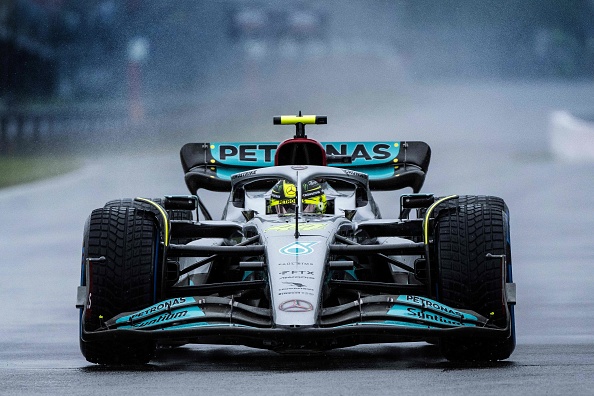
Lewis Hamilton is a legendary wet weather driver. It’s no surprise that he’s regarded as the greatest in history. The Brit mastered the wet conditions even before entering Formula 1 during his karting days. Throughout his brilliant F1 career, he delivered a series of rain-soaked masterpieces, some of which went down in history as the best drives of all time.
In 2007, 22-year-old rookie Hamilton delivered a masterful performance in a chaotic Japanese Grand Prix. In torrential rain at Fuji, Hamilton mastered the conditions and won the incident-packed 67-lap race that saw his McLaren teammate and title rival Fernando Alonso crash out. Hamilton took a huge step closer to the world championship title going 12 points clear of Alonso. The championship was eventually won by Ferrari’s Kimi Raikkonen, who was only one point ahead of McLaren’s rising star.
After that incredible victory, Hamilton said, “Driving in the wet, leading and doing the last lap thinking of some of the races that Senna was in and Prost – it sort of made me feel that I’m on my way to achieving something similar to them.”
Hamilton mastered driving in torrential weather, winning every wet race from Japan in 2014 to Germany in 2018. He equalled Schumacher’s record of seven world championship titles in a rain-soaked Turkish Grand Prix in 2020, and he marked an insane record of 100 wins in a wet/dry thriller at Sochi in 2021.
2008 British Grand Prix
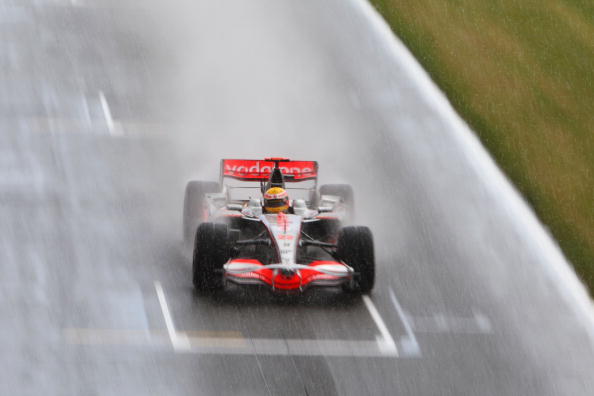
It was Hamilton’s second home race of his career, and he was hoping for a victory after a third-place finish in 2007. The sophomore driver lined up fourth on the grid behind Ferrari’s Kimi Raikkonen, Red Bull’s Mark Webber and his teammate and polesitter Heikki Kovalainen at a very wet Silverstone. Hamilton made a great start, passing Raikkonen and Webber at the first corner, and moved up right behind race leader Kovalainen. It was only the fifth lap when he found a way to pass his teammate and place himself into first.
The race saw Robert Kubica, Jenson Button, Nelsinho Piquet, Giancarlo Fisichella, Adrian Sutil, Sebastian Vettel and David Coulthard all retiring from the race due to spins and accidents. Hamilton’s title rival Felipe Massa spun five times on his way to last place. The 60-lap race was eventually won by Hamilton who finished at least one lap ahead of 17 cars in torrential rain. To this day, this victory is regarded as one of his greatest wins after delivering a wet-weather masterclass at age of 23.
#OnThisDay 🎥 Lewis Hamilton delivered a wet-weather masterclass at the 2008 British Grand Prix #F1 pic.twitter.com/pw9VjPNMn9
— Mr Lawrence🇬🇧🇬🇩🌸 (@Mr_Lawrence4) July 6, 2021
All wet-weather races won by Hamilton (so far)
| Grand Prix | Started | Result |
| Japan 2007 | 1st | 1st |
| Monaco 2008 | 3rd | 1st |
| Great Britain 2008 | 4th | 1st |
| Turkey 2010 | 2nd | 1st |
| Belgium 2010 | 2nd | 1st |
| Japan 2014 | 2nd | 1st |
| Great Britain 2015 | 1st | 1st |
| Monaco 2016 | 3rd | 1st |
| Great Britain 2016 | 1st | 1st |
| Brazil 2016 | 1st | 1st |
| Singapore 2017 | 5th | 1st |
| Germany 2018 | 14th | 1st |
| Turkey 2020 | 6th | 1st |
| Russia 2021 | 4th | 1st |
Wet races: 40* | Wins: 14* | Win percentage: 35%
Honourable Mentions
We can’t make this list without mentioning other notable wet-weather performances in the past. Although there are many more, we only selected three that we believe were won in unusual circumstances.
Jackie Stewart – 1968 German Grand Prix
Starting sixth and driving with a broken wrist. Jackie Stewart drove his Matra MS10 to his fourth career victory on the 14.2-mile Nürburgring circuit in extremely wet and foggy conditions, beating Lotus-Ford’s Graham Hill by four minutes and three seconds. This race is regarded as one of the finest wet-weather drives in history and Jackie Stewart’s all-time best.
Jenson Button – 2011 Canadian Grand Prix
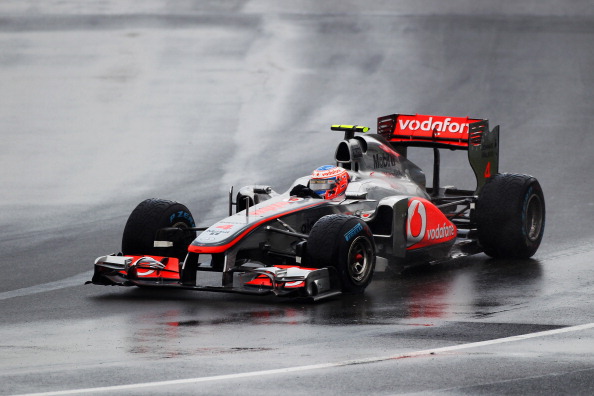
The race of the century. Jenson Button’s tenth career victory was definitely historic. Starting seventh in a rain-soaked Canadian Grand Prix, Button’s path to victory saw him survive many scares including a collision with McLaren teammate Lewis Hamilton. A drive-through penalty, a puncture, a record of six pit stops and six safety cars due to heavy rain. A drop to last on the grid, and, finally, a last-lap mistake by Red Bull’s Sebastian Vettel that allowed the Brit to overtake him and snatch the victory, despite not leading a single lap in the 70-lap race. The 2011 Canadian Grand Prix lasted for four hours and four minutes, making it the longest race in Formula 1 history.
Sebastian Vettel – 2008 Italian Grand Prix
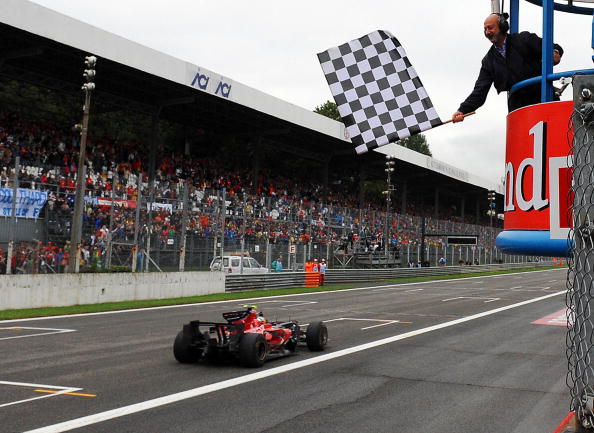
Sebastian Vettel produced some exceptional wet-weather performances, including a rain-soaked Monza in 2008. The German mastered the tricky wet conditions and won the 53-lap race by 12 seconds using a 2007-spec engine. This was the first career victory for Vettel and the first for Toro Rosso. Vettel, who was only 21 at the time, became the youngest race winner and polesitter ever. That was one of the most surprising wins as no one predicted a victory or a pole position for underdog Vettel or tiny Toro Rosso.
What is the best wet-weather race of all time? Join the LWOS community and share your opinion in the comments section.


